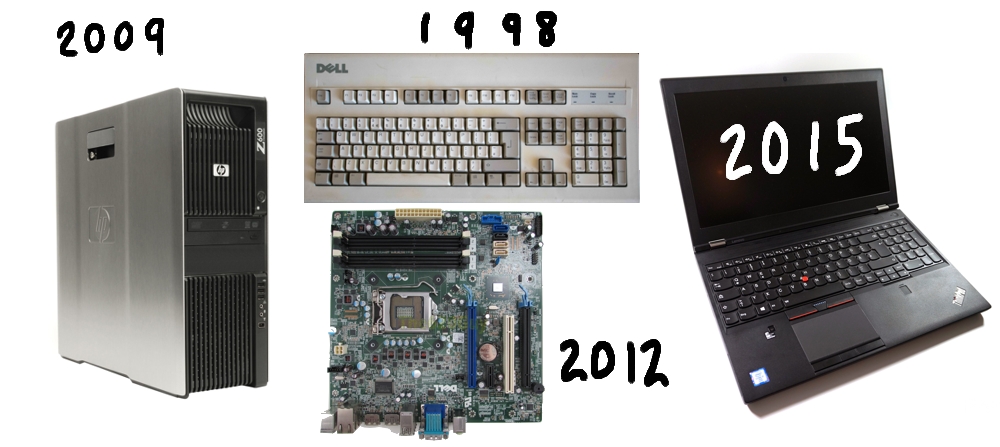
The reason I'm using old in quotation marks is because the term "old" is relative and largely dependent on the expected lifespan of a product. A Commodore 64 and a Pentium 4 PC would both be considered old and obsolete today, but they are not in the same ball park, the latter has a lot more in common with computers we have today.
Smartphones have a relatively short lifespan. Hence why most people I know have their phone on a contract and end up upgrading every 2 years. Even if you buy your phone outright, you may have to buy a new phone sooner than you'd like if it can't run newer versions of Android or iOS.
In contrast, driving a 10-15 year old car isn't that uncommon. Since cars are expensive, most people won't replace it unless something drastic happens (e.g., engine blows up) and it's more cost effective in the long run to get a new one.
Unsurprisingly, a lot of people collect old computers. Whether it's from the 80s, 90s, or 2000s, there's a lot of nostalgia associated with old computers and old tech in general (e.g., iPods, CRTs, game consoles).
However, I'm not a collector. I generally don't own stuff just for the sake of it and a lot of the hardware I showcase is either sold or donated unless I have a use case for it outside of making a video (as was the case with the pink netbook).
So while an iMac G3 looks cool, realistically it's just gonna sit in my house collecting dust 99% of the time (unless I decide to install Gentoo on it, but then what?).
Due to the trend of planned obsolescence, hardware no longer lasts as long. And often it's not because of the hardware itself failing, but software being altered to artificially make hardware obsolete in practice.
I despise this trend. As a consumer, I believe I should be free to upgrade at my own convenience and only if I want to. My desktop computer is too old to officially run Windows 11. Of course, there are hacks to bypass this (e.g., registry edits, powershell scripts, custom ISOs), but why should you even have to do that?
That said, planned obsolescence is harder to combat for some devices compared to others. For example, custom ROMs like LineageOS can extend the life of Android smartphones, but they also come with caveats (e.g., some apps won't run if the device is rooted and/or has an unlocked bootloader).
Due to the nature of my computing, I don't feel the need to use a more modern computer:
I find it funny how YouTubers say things like "AM4 is dead", while I'm here using Sandy Bridge and DDR3 in 2025.
(To be fair, they do have a point. If you're building a NEW system, it makes sense to future-proof if you have the budget for it. However, if you already have a computer and it runs fine, don't feel like you have to upgrade just for the sake of it).
This is a bit finicky. A newer system can be more cost effective in the long term, especially when you consider factors like power consumption. Some people may also appreciate the peace of mind of buying new as buying used does have risks.
However, the hardware I use had already depreciated in value by the time I bought it. My laptop costed around $1500 when it was brand new, but I bought it for £120 (approx $160). Likewise, old office PCs and workstations which used to cost thousands are now cheap as chips (parts are also very cheap). I bought a Dell Precision T1650 for about £50. Contrast that with a new build where you could easily spend over £50 on just the motherboard (even for a budget build).
I haven't had many issues buying used parts. That said, I never buy used power supplies and I generally avoid used hard drives and SSDs unless the drive isn't going to be storing anything important.
It's also worth noting that "old hardware = cheap" mostly just applies to common and generic PC hardware. Vintage stuff can be very expensive, but chances are you're not gonna be daily driving that stuff anytime soon.
Aside from superficial things like saving money and reducing e-waste. There are instances where older stuff has a legitimate advantage over newer stuff. Here are some examples:
Of course, a lot of these advantages are oddly specific and probably irrelevant if you're a normal person (unlike me), but still, it should demonstrate that I don't use old stuff purely for the novelty of it.
The point of this article is not to convince you to do what I do. Newer hardware exists for a reason, but for my oddly specific circumstances, older hardware works remarkably well.